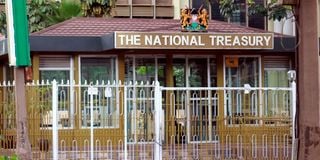Premium
CMA eyes Sh25m in new levy from e-forex brokers

The National Treasury Building in Nairobi. Following the Treasury’s new regulation, brokers will now be required to remit an annual fee to the regulator
Treasury’s newly introduced regulatory fee on online forex brokers, is projected to net about Sh24.86 million in a fresh revenue stream for the Capital Market Authority (CMA), an analysis shows.
In changes to online forex trading regulations, Treasury Cabinet Secretary Njuguna Ndung’u says brokers would now be required to remit an annual fee to the regulator.
“The Capital Markets (Online Forex Exchange Trading) Regulations, 2017, hereinafter referred to as the “principal Regulations”, are amended by inserting the following new regulation immediately after regulation 25,” said Prof Ndung’u.
“An online forex broker shall pay to the authority an annual fee based on the gross trading revenue, which shall include the commissions and rebates from third-party related service providers for that year, at the rate specific in the Third Schedule,” he said.
According to the new rules, both dealing and non-dealing online forex brokers will remit an annual three per cent fee to the CMA, based on their gross revenue including commissions and rebates.
An analysis by the CMA shows that the new levy will net about Sh24.86 million going by the Sh828.81 million gross trading revenue realised by the six online forex traders in 2022.
The data by the regulator reveals that EGS Securities Limited realised Sh529.23 milllion from online forex trade last year, Exinity Capital East Africa (Sh1.83 million), Pepperstone Markets Kenya Limited (29.39 million), and SCFM Limited (Sh252.16 milion).
Others are HFM Investments (Sh8.35 million) and Winsor Markets (Kenya) Limited (Sh7.83 million).
“The three per cent is benchmarked on other jurisdictions such as UK and USA with the levy being applied to gross revenue as a way of addressing misrepresentation of revenue. It is noteworthy that the bulk of the income is through rebates from their mother companies offshore,” said CMA in memorandum on the new levy.
A dealing forex broker or market maker is a broker that takes the other side of a client’s trades, by setting the bid and ask price and waiting for a trader who would like to take advantage of these set terms.
Dealing desk brokers profit by buying at lower prices and selling at higher prices, and by taking advantage of the spreads between the bid and ask prices.
On the other hand, non-dealing brokers work with liquidity providers to give their clients variable spreads and to match traders with other dealers who would like to take the other side of a trade.
Non-dealing desk brokers also tend to have lower spreads than dealing desk brokers.
The charge on online forex brokers comes in the wake of enhanced protection offered by the CMA to currency traders/clients.
The capital markets regulator has established a working group comprising licensed forex brokerage community and other stakeholders to develop standards to further protect consumers.
CMA is, for instance, seeking to ensure that licensed forex brokers make appropriate disclosures and that they roll out a comprehensive investor education programme.
The review seeks to mitigate the risks and losses associated with investments in Contract for Differences (CFDs) products.
CFDs refer to contracts between buyers and sellers, which stipulate that a buyer must pay a seller for the difference between the current value of an asset and its value at contract time with the asset portfolio including currencies.
CMA’s move to enhance the protection of forex traders comes amid sustained interest in forex trading among the investing public.





